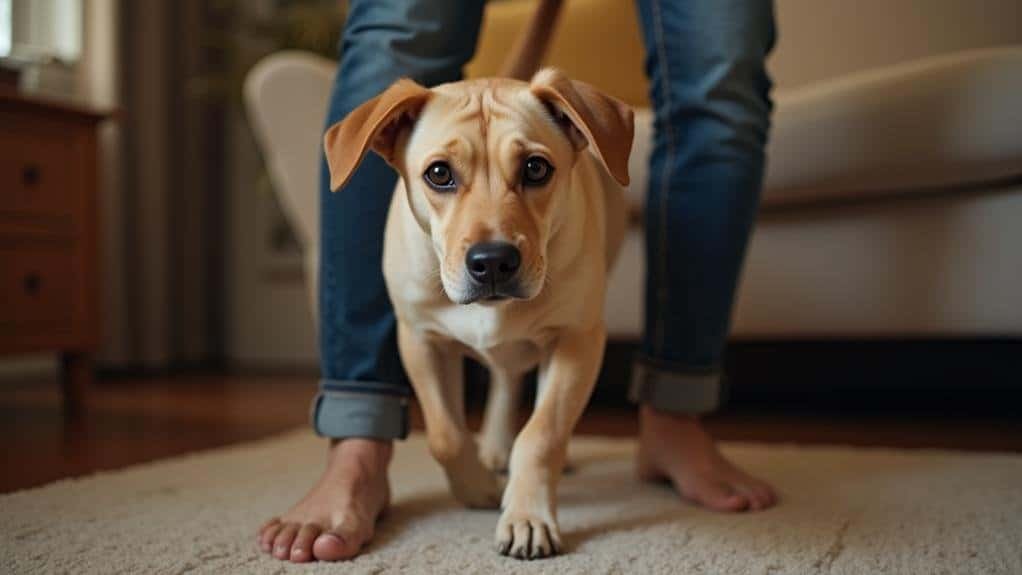Your female dog's sudden clinginess can stem from various factors. Hormonal changes, especially during heat cycles or pregnancy, often lead to increased attention-seeking behavior. Underlying health issues like urinary tract infections or cognitive decline may also cause your dog to seek comfort. Environmental changes, such as moving homes or altering routines, can trigger anxiety and clinginess. Age-related concerns, including sensory impairments, might contribute to your dog's newfound attachment. It is crucial to observe any accompanying symptoms and consult your veterinarian if the behavior persists. Understanding the root cause will help you address your dog's needs and manage her clinginess effectively.
Recognizing Clingy Dog Behavior

In and around your home, you may notice your dog constantly sticking by your side. This clingy behavior, often called being a "Velcro dog," can manifest as excessive attachment and a constant need for your presence or attention.
Understanding changes in your dog's behavior is essential to identifying potential underlying issues.
Signs of clinginess include your dog following you everywhere, excessive barking when you're out of sight, pawing at you for attention, and displaying jealousy when you interact with others. These behaviors might indicate separation anxiety or other emotional states that require your attention.
It's important to recognize that clingy dogs may be experiencing anxiety, stress, or insecurity. Some dog breeds, like Shih Tzus and Labrador Retrievers, are naturally more prone to clingy behavior due to their companionship-driven nature.
However, sudden changes in clinginess could signal deeper problems.
Hormonal Changes and Pregnancy

While many factors can influence a dog's behavior, hormonal changes and pregnancy often lead to significant shifts in their demeanor. If your female dog isn't spayed, she'll experience heat cycles approximately every six months. These cycles cause hormonal fluctuations that can trigger clingy behavior, restlessness, and increased attention-seeking.
During heat, you might notice your dog exhibiting nesting behaviors or becoming more affectionate. These changes are normal responses to the hormonal surges affecting her mood.
If your dog becomes pregnant, she may grow even clingier as she seeks comfort and security during this vulnerable time.
It's important to recognize that sudden behavior changes, including increased clinginess, can also indicate health issues. Regular vet check-ups are essential to confirm pregnancy and monitor both the mother's and pups' health.
These visits will help you differentiate between normal hormonal changes and potential health concerns.
As an owner, understanding and managing these hormonal shifts can help you effectively address your dog's sudden clingy behavior. By providing extra support and attention during heat cycles or pregnancy, you'll help your furry companion feel secure and comfortable during these significant life changes.
Health Issues in Female Dogs
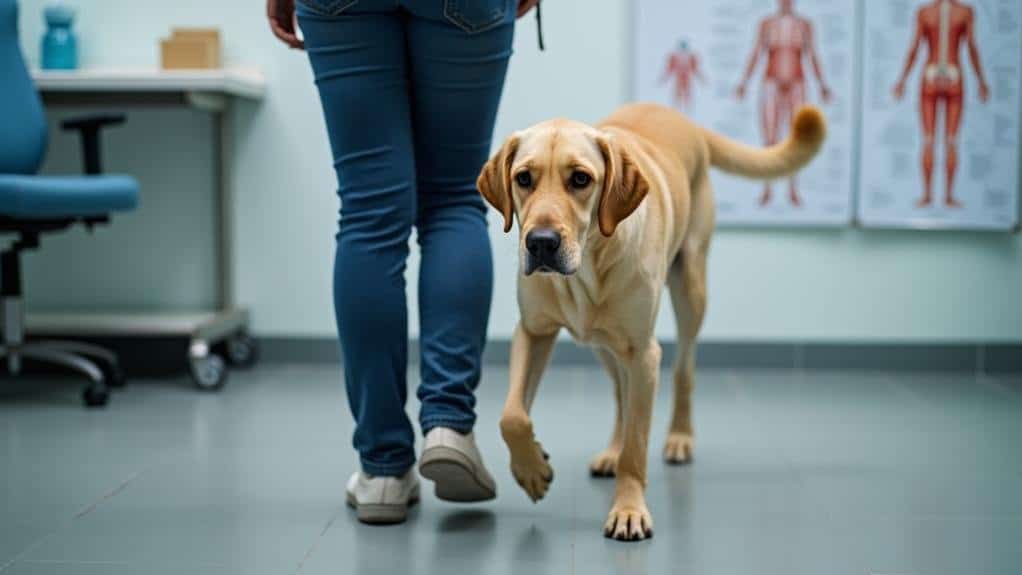
Vigilance is key when it comes to your female dog's health. If you've noticed sudden clingy behavior in your furry companion, it might be a sign of underlying health problems. Female dogs often seek comfort from owners when they're experiencing pain or discomfort, making it vital to pay attention to these behavior changes.
Various health issues can trigger clinginess in female dogs. Urinary tract infections, hormonal imbalances, and arthritis are just a few conditions that may cause your pet to become more affectionate than usual. Additionally, hormonal fluctuations during heat cycles can lead to increased clinginess.
As your dog ages, cognitive decline might also manifest as clingy behavior. Confusion and disorientation can prompt your pet to stay close for security. It's important to recognize these signs and seek professional help.
To safeguard your female dog's well-being, schedule regular veterinary check-ups. These visits are fundamental for identifying and addressing health problems early on.
Environmental Factors and Anxiety
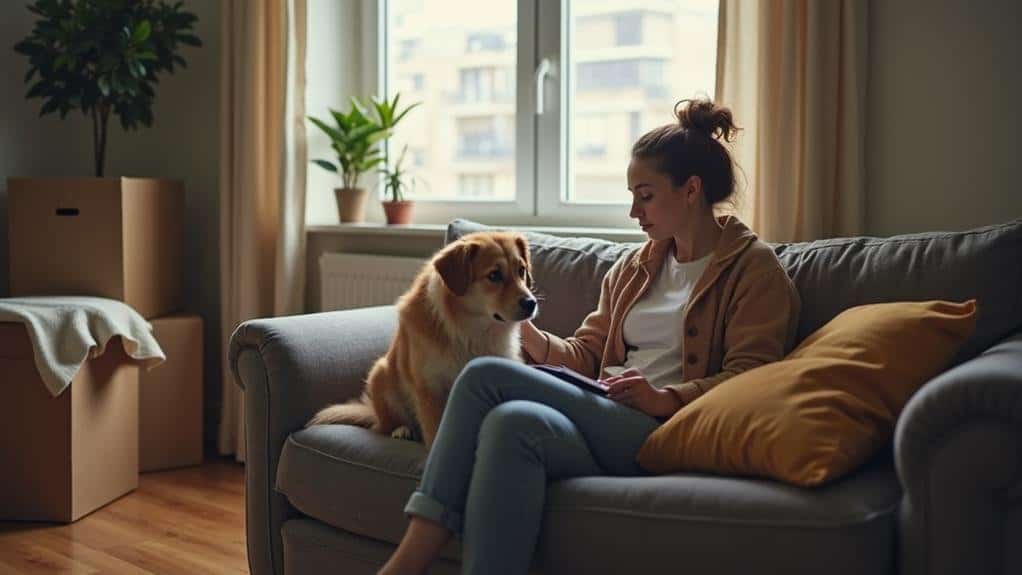
Dogs are highly sensitive to their environment, and changes in their surroundings can greatly impact their behavior. If you've noticed your female dog becoming suddenly clingy, environmental factors and anxiety could be the culprits.
Environmental changes, such as moving to a new home or introducing new pets or family members, can disrupt your dog's sense of security. This disruption often leads to clingy behavior as your pet seeks comfort from you.
Similarly, routine changes like altering feeding or walking schedules can create anxiety, prompting your dog to become more attached.
Your dog is attuned to your emotional states, and if you're experiencing stress or anxiety, she may mirror these feelings, resulting in clingy behavior. Loud noises, like thunderstorms or fireworks, can also trigger anxiety, causing your dog to seek closeness for reassurance and safety.
As a pet owner, you can help alleviate anxiety-related clinginess by maintaining consistent routines and providing a stable environment. This fosters a sense of security and comfort for your dog.
Age-Related Clinginess Concerns
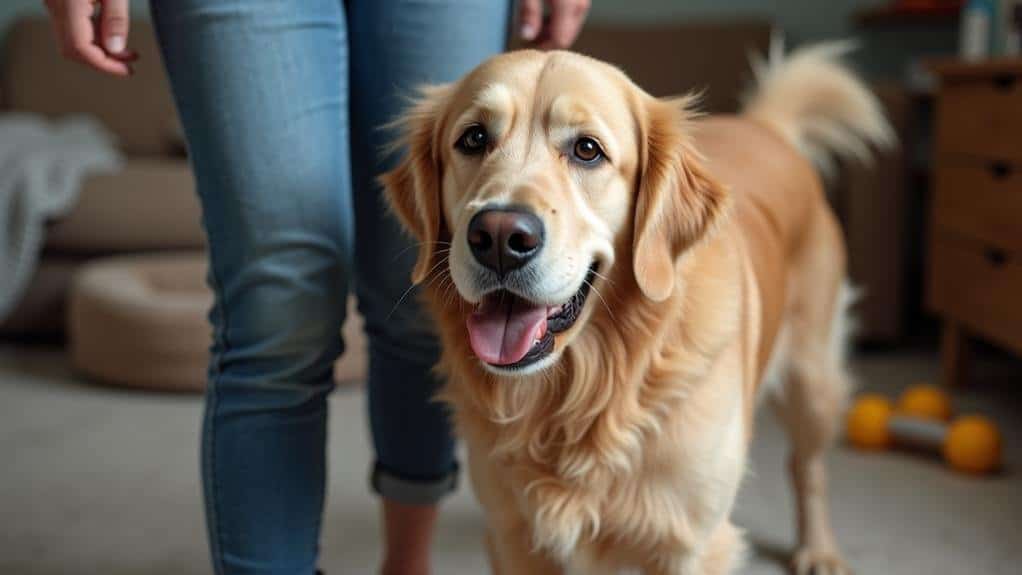
As your female dog enters her golden years, you may notice an increase in clingy behavior. This change often stems from age-related factors affecting her physical and mental well-being.
Aging dogs can experience canine cognitive dysfunction, similar to dementia in humans, leading to confusion and disorientation. This confusion can make your dog more anxious and dependent on you for comfort.
Senior dogs may also develop sensory impairments, such as hearing or vision loss, which can contribute to clingy behavior. These changes can make your dog feel more vulnerable, prompting her to seek security from you.
Additionally, physical discomfort or pain associated with aging can cause your dog to rely more heavily on your support and reassurance.
To address age-related clinginess concerns, it's essential to maintain regular veterinary check-ups. These visits can help identify health issues that may be causing anxious behavior.
Establishing consistent daily routines can also provide a sense of security for your aging dog, reducing anxiety and clinginess.
Managing Your Dog's Newfound Attachment
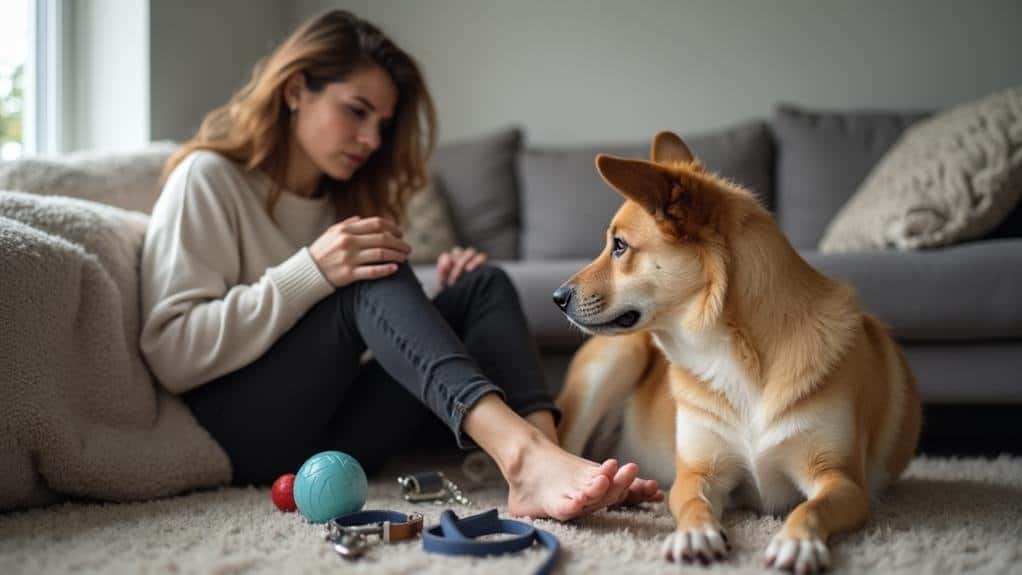
While understanding the causes of your dog's clinginess is important, taking proactive steps to manage this newfound attachment can greatly improve both your and your pet's quality of life.
To address clingy behavior in dogs, start by gradually increasing their exercise routine. This helps expend excess energy and reduces their tendency to stick close to you.
Incorporate interactive toys into your dog's daily activities to provide mental stimulation and encourage independence while you're away.
Create a designated safe space where your pet can retreat and feel secure when they need time alone. This fosters a sense of independence and reduces anxiety.
Practice desensitization techniques by moving around the house without your dog and rewarding them for remaining calm. This helps reduce anxiety related to your movements and teaches them that it's okay to be apart.
If clinginess persists despite these efforts, consult your veterinarian. They can provide tailored strategies and rule out potential underlying health concerns.
Frequently Asked Questions
Why Is My Female Dog so Clingy Lately?
Your female dog's sudden clinginess could stem from hormonal changes, health issues, separation anxiety, stress, or aging. It's important you observe her behavior closely and consult a vet to rule out any underlying medical concerns.
Why Is My Female Dog so Affectionate All of a Sudden?
Your female dog's sudden affection could be due to hormonal changes, pregnancy, or health issues. She might be mirroring your emotions or seeking comfort after environmental changes. It's best to monitor her behavior and consult a vet if you're concerned.
Why Is My Girl Dog Acting Weird?
Your girl dog's weird behavior could stem from hormonal changes, pregnancy, health issues, or anxiety. She might be in heat, feeling unwell, or experiencing stress. It's important to observe her closely and consult your vet if you're concerned.
Do Dogs Go Through a Clingy Phase?
Yes, dogs can go through clingy phases. You'll notice your pup sticking closer to you due to changes in their environment, health, or emotional state. It's often temporary and can be managed with patience and understanding.
Conclusion
You've explored various reasons for your female dog's sudden clinginess, from hormonal changes to health issues and environmental factors. Remember, it's essential to observe her behavior closely and consult your vet if you're concerned. With patience and understanding, you can address the root cause of her newfound attachment. Whether it's providing extra comfort or addressing an underlying issue, you'll be able to help your furry friend feel secure and happy again.

